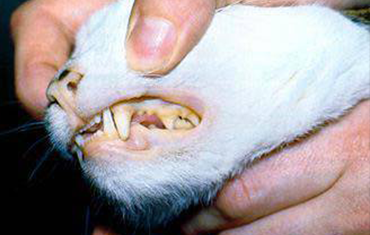
Red blood cells carry oxygen to the cells in the body and pick up carbon dioxide. Is Anemia in Cats Dangerous.

That said to determine the cause of anemia in cats your veterinarian will have to get a thorough history do a physical examination and do extensive testing.
What would cause anemia in cats. Common causes of anemia in cats include. Blood loss due to internal or external bleeding. Auto-immune conditions where the immune system destroys its own RBCs.
Examples include rat poison zinc lead acetaminophen Tylenol and onions. What Are Some Other Causes of Anemia in Cats. Blood loss from fleasticks and parasites or an injury can cause regenerative anemia.
Kittens can be at particular risk. A lot of fleas on a tiny kitten can suck that kitten dry. Its sort of like the ultimate vampire routine Dr.
That type of anemia is strictly from blood loss. The blood cells are not being damaged she notes. Non-regenerative anemia in cats is most often caused by kidney failure renal failure.
If your cat is healthy their kidneys create a hormone that helps to produce red blood cells. When the kidneys fail to work properly your cats body is unable replace red blood cells as quickly as the cats body uses them resulting in anemia. Here are the most common causes of anemia in cats.
If your pet has suffered a blow or accident. It may have lost a lot of blood or have suffered. Fleas ticks or lice can cause a cat to lose lots of blood and therefore suffer from anemia.
Feeding with few. A highly unusual cause of feline anemia is a rare condition called neonatal isoerythrolysis an immune-mediated condition in which kittens with. The main causes of blood loss in cats include.
Trauma or injury to blood vessels or internal organs resulting in bleeding severe parasitic infestations with fleas ticks or hookworms tumors benign or malignant of the intestinal tract kidneys and urinary bladder that begin to bleed. There are many causes of anemia including excessive blood loss due to trauma immune-mediated diseases when the body attacks its own cells or organs cancer genetic defects disease of the kidneys and other major organs infectious diseases and bone marrow disease. Some infections that can cause anemia in cats include feline leukemia virusfeline immunodeficiency virus Haemobartonella bacterial species and Cytauxzoon parasites.
Genetic Diseases Inherited red blood cell disorders can also cause anemia in cats. If the anemia is caused by an infection toxic substance organ failure hormone deficiency nutrient deficiency or feline viral infection the veterinarian will prescribe treatment based on the specific cause. Recovery of Anemia in Cats.
However two of the most common causes of anemia from blood loss in cats are due to flea andor tick infestations and hookworm infections. Is Anemia in Cats Dangerous. Fleas and ticks drink animals blood to live and reproduce.
Anemia is plainly obvious with a simple blood test called a hematocrit which is the percentage of the blood that is comprised of red blood cells. Normal hematocrit for cats is about 30-45. If your cats hematocrit is less than about 18 you should consider a transfusion.
Signs of Anemia in Cats Pale gums Increased heart rate Increased breathing rate Lethargy excessive sleepiness Weakness Decreased appetite Increased water intake Collapse. Several tests are important for an anemic cat because there are many diseases that cause anemia. These are grouped into 1 diseases that cause blood loss 2 diseases that cause hemolysis red blood cell breakdown and 3 diseases that decrease the production of red blood cells.
What diseases of cats cause blood loss. If your cat has anemia theres been a drop in the number of his red blood cells. Red blood cells carry oxygen to the cells in the body and pick up carbon dioxide.
A low red blood cell count can result from many causes. The destruction of the red blood cells such as with Feline IMHA a variation of anemia in which your cats immune. That said to determine the cause of anemia in cats your veterinarian will have to get a thorough history do a physical examination and do extensive testing.
Historical questions may include vaccine history previous medical problems exposure to FeLVFIV travel history indooroutdoor status flea and tick exposure toxin or drug exposure. Anemia can be caused by diseases and parasites so make sure your cat stays current on flea and tick medications and the vaccines that your vet recommends. Be sure to keep toxins like human medications garlic and onion powder and mouse and rat poison where your kitty cant get to them.